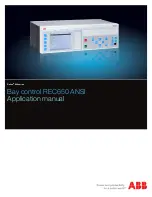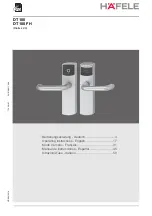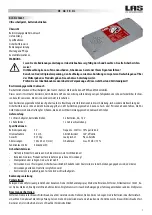
APPENDIX C: COMMAND LINE INTERFACE
COMMAND LINE INTERFACE
L90 LINE CURRENT DIFFERENTIAL SYSTEM – INSTRUCTION MANUAL
C-3
C
Example of a batch file that checks for an error (this batch file uses standard batch file operations to check the return
code (ERRORLEVEL) and jump to an error handler):
SetupCLI URPC start
SetupCLI URPC login -d demoDevice -a SETTINGS -w WrongPassword -A traditional
IF NOT ERRORLEVEL 0 GOTO FAILED
SetupCLI URPC putsettings -d demoDevice -f "example file.urs"
SetupCLI URPC inservice -d demoDevice
SetupCLI URPC reboot -d demoDevice
SetupCLI URPC exit
exit
:FAILED
echo Please try again
exit
For CyberSentry devices with local authentication
— Set <authentication type> to "local" . Set <account> to
"Supervisor", "Administrator", "Engineer", "Operator", or "Observer".
For CyberSentry devices with RADIUS authentication
— Set <authentication type> to "radius". Set <account> to the
user's account on the RADIUS server.
SetupCLI <Application> logout -d <device> [-s]
Log out of device <device>.
Example: SetupCLI URPC logout -d C30
SetupCLI <Application> getsettings -d <device> -f <File> [-s]
Read settings from device <device> and save them to the .urs file <File>. The <File> must not already exist. The default
path to the output file is C:\Users\Public\Public Documents\GE Power Management\URPC\Data
Example: SetupCLI URPC getsettings -d C30 -f "C30 Markham.urs"
Example of a batch file to retrieve a settings file:
SetupCLI URPC start
SetupCLI URPC getsettings -d demoDevice -f C:\example.urs
SetupCLI URPC exit
Example of a batch file to retrieve a settings file from a relay that requires RADIUS authentication:
SetupCLI URPC start
SetupCLI URPC login -d demoDevice -a %1 -w %2 -A radius
SetupCLI URPC getsettings -d demoDevice -f "example file.urs"
SetupCLI URPC logout -d demoDevice
SetupCLI URPC exit
Although a user name and password could have been entered in this batch file, it would have created a security risk.
Batch files allow you to pass in runtime parameters and refer to them in your script as %1, %2, and so on. For example,
if this file is called example.bat, one calls it as follows: "example.bat MyUserName MyPassword"
SetupCLI <Application> putsettings -d <device> -f <File> [-s]
Write the settings file <File> to the device <device>.
For CyberSentry devices, putsettings is only supported for users with the "Administrator" role.
Example: SetupCLI URPC putsettings -d C30 -f "C30 Markham.urs"
















































